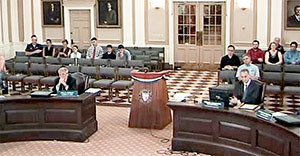
The Board of Aldermen rejected a plan to allow direct PILOT payments by Tufts.
By Josie Grove
The discussion around a minor vote at the May 28 Board of Aldermen meeting raised a series of perennial frustrations for the Board of Aldermen.
At issue was whether to establish an account to automatically accept an annual gift from Tufts, or put accepting the gift to a vote every year. “It was a little bit odd I think that we had a long discussion to establish an account,” said Ward 5 Alderman Mark Niedergang. Ward 1 Alderman Matthew McLaughlin explained that the Board would never refuse the gift, but, “Having to accept the money would provide an opportunity to discuss Tufts’ role in our community.” All nine aldermen at the meeting voted against creating an account.
Tufts has an agreement to make payments to the City of Somerville instead of paying taxes. This arrangement, called a Payment In Lieu of Taxes (PILOT), is common between municipalities and large non-profit institutions, like universities and hospitals. Under the latest agreement, established in 2013, Tufts gives Somerville $1.375 million over five years, or $275,000 each year. Kim Thurler, Tufts’ Director of Public Relations, explained that “In accordance with the mayor’s request, we divide that into two payments, $75,000 each June and the balance of $200,000 in December.”
The City of Boston also has a PILOT agreement with Tufts. According to City of Boston data, Tufts paid $425,000 to Boston in 2014, in lieu of $4.9 million in taxes. Aldermen Niedergang and McLaughlin both expressed disappointment that Somerville gets much less from Tufts, even though the university’s main campus is in Somerville. “A number of aldermen, including myself, feel that Tufts doesn’t do enough for the city,” said Niedergang.
The comparatively low PILOT was just the beginning of the aldermen’s concerns. “In and of itself it wasn’t a big issue but it’s a symbolic issue,” Niedergang said. “There’s issues around Tufts. Recently, there’s this issue with the janitors being fired, which a lot of aldermen were not happy about.”
Tufts University Director of Public Relations Kim Thurler defended the university in a statement “Tufts values its relationship with the City of Somerville and is proud to contribute to the city and the community in many ways, including job creation, partnerships with Somerville schools, purchases of local goods and services, and grants to local non-profits.”
So what does this have to do with setting up an account to automatically accept a gift? “By voting against establishing an account, any time Tufts makes a donation to Somerville, the board of aldermen has an opportunity to discuss it,” said Niedergang. Alderman-at-large Dennis Sullivan agreed. “I think Tufts could be a better neighbor. I think a no vote makes sense, it give us a forum to talk about those issues.”
McLaughlin also voted against creating the account. “We were basically told we have no control over that money. I’d like an opportunity to comment every year on how this money should be spent.”
One of the primary responsibilities of the Board of Aldermen is the city budget, and distributing the money that the city collects. But the mayor’s office, not the Board of Aldermen, gets to decide how to spend gifts. “These funds are outside the official process by which aldermen approve city expenditures,” said Niedergang. “The mayor’s right legally,” he said, but he thinks that the Board should have more oversight. Even though voting to accept a gift is largely a formality, the aldermen did not want to give up the power to accept gifts. “Anytime we get a gift, the city can do what we want with the money,” said McLaughlin. “We only have control over accepting it, and we were basically asked for us to that up as well.”
“It was an example of us giving up control over the budget for the purpose of efficiency, which I do not think we need,” continued McLaughlin. “From their perspective, it’s easier to utilize the money, but from my perspective, it was kind of cutting us out of the process.”















Reader Comments